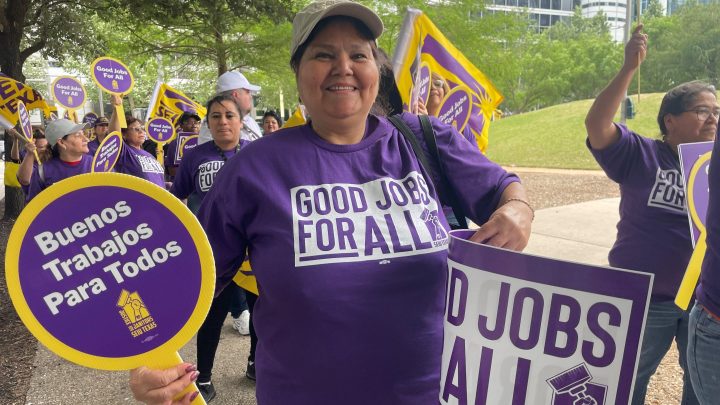
Salvadoran janitors fight for better wages, supporting families here and abroad
Salvadoran janitors fight for better wages, supporting families here and abroad

For decades, Salvadoran janitors have quietly swept, vacuumed and wiped down office buildings in cities across the United States. But at a recent protest in Houston, their voices were loud and firm:
“Trabajadores unidos jamás serán vencidos!” (Workers united will never be defeated!)
Marching past skyscrapers downtown, hundreds of janitors — most of them from El Salvador and other parts of Latin America — asked for better benefits and pay. If provided, that money wouldn’t just support families in the U.S. Much of it would be sent to family members in their home countries, providing vital support to low-income communities.
“We’re here fighting, and this is our story, this is our fight to survive in this country,” janitor Nuria Gomez de Gonzalez said in Spanish.
Originally from El Salvador, Gomez de Gonzalez has been cleaning Houston offices for almost 20 years. Her pay was around $5 an hour when she started; now, it’s a little over $13.

Janitorial work has been an important source of income for immigrants from El Salvador. Some 51,300 of them work these hard-to-fill jobs in the United States. It’s the second-most-common occupation for Salvadorans behind construction, according to the American Immigration Council.
These workers are concentrated in cities like Los Angeles, Washington, D.C. and Houston, where they make up a large share of the janitor workforce. Many have participated in local labor movements and Justice for Janitors.
Gaspar Rivera-Salgado, project director of the Labor Center at the University of California, Los Angeles, said Salvadoran community organizing in the U.S. traces back to the 1980s, during the civil war in El Salvador. At the time, Salvadoran civil rights leaders went to Los Angeles and other cities to create organizations to support arriving migrants, such as Carecen.
“In the span of 10 years, Salvadorans were able to build these civil rights organizations that was the envy of the Mexican population,” he said.
In Los Angeles, numerous incoming Salvadorans took low-wage jobs as janitors at a time when wages were decreasing.
“These low-income workers, they reenergized the labor movement that has started a path forward to regain some foothold to defend some of the salaries,” Rivera-Salgado said.
In Texas, a state that discourages unionizing, Houston’s janitors organized in the 2000s, winning their first contract in 2006 after taking to the streets.
Nuria Gomez de Gonzalez was there at the first protest. And she’s marched several times since then. At the April march in Houston, she and her fellow janitors with the SEIU advocated for a path to $15 an hour in wages, as well as full-time employment and benefits for overnight workers.

In Houston, more than 5,000 janitors are immigrants from El Salvador, which is roughly 10% of the janitorial workforce. Yet they are less than 3% of working people in the city.
Even though Gomez de Gonzalez’s wages are well below the average in Texas, they represent economic opportunity and stability for her and her family.
She said she fled El Salvador to escape her abusive ex and came to Houston to work and support her children. “I lived with a lot of domestic violence,” she said.
Gomez de Gonzalez has been able to provide for her family and fight for better work contracts over the years thanks to temporary protected status, a designation that grants her and roughly 190,000 Salvadorans the right to work and live in the U.S. without the threat of deportation.
Quality of life in Houston is better than in El Salvador — a poor country with high homicide rates. However, making ends meet in the U.S. has required a strong work ethic and a strict budget.
She and her husband, who’s from Honduras, together take home about $3,000 a month, which just doesn’t go as far nowadays.
“Everything is getting more expensive, Dios mío,” she said.
Most of her income goes toward rent for her apartment and groceries. “I go with $200, $300 to fiesta, and I bring back hardly any food. It’s so expensive,” she said.
A lot of what’s left over after living expenses goes back home. She sends hundreds of dollars to El Salvador each month. Some is to support family members and some goes to investments in property there.
Dollars from family members in the U.S. are a powerful economic engine for communities in El Salvador.
In the last year, roughly $8.8 billion was sent from abroad to families in El Salvador, according to February data from the nation’s Central Reserve Bank.
“When you receive remittances from overseas, you spend it somehow. And that spending goes to other households in the community, other small businesses. So, there’s increases in aggregate economic activity in the local area,” said University of Michigan economist Dean Yang.
The working-class wages people like Gomez de Gonzalez are fighting to increase don’t just improve the lives of Salvadorans in the U.S. — they’re also a pillar of the Salvadoran economy.
There’s a lot happening in the world. Through it all, Marketplace is here for you.
You rely on Marketplace to break down the world’s events and tell you how it affects you in a fact-based, approachable way. We rely on your financial support to keep making that possible.
Your donation today powers the independent journalism that you rely on. For just $5/month, you can help sustain Marketplace so we can keep reporting on the things that matter to you.











